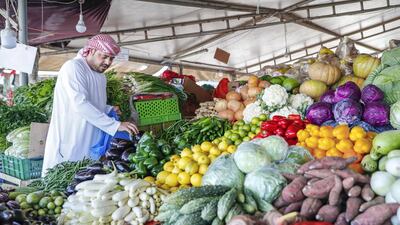Supermarkets across the UAE have removed fruit and vegetables imported from Kerala in the wake of a ban sparked by the outbreak of a deadly virus.
The Ministry of Climate Change and Environment announced the move on Tuesday as the World Health Organisation posted warnings about an outbreak of the Nipah virus in the south Indian state.
The virus has killed at least 13 people in India and the UAE's health authorities have warned residents and citizens against travelling to any areas where the infection has spread.
Emergency measures have been imposed in Kerala following the emergence of Nipah, which has a mortality rate of 70 per cent and no vaccine.
It is believed that the virus is hosted by the fruit bat, which is known to feed on mangoes, dates and bananas in particular. Infection occurs through direct contact with infected bats, animals or other people, or through consuming fruit or unpasteurised fruit juice that has been contaminated by bats.
The ministry issued a circular to local food control authorities and municipalities across the emirates to prevent the entry of all kinds of produce from that region.
A statement contained the following advice for people purchasing fruit and vegetables in the UAE:
- Make sure that the fruits are ripe, fresh and non-withered, wet, colour-changed or overripe
- Before eating fruit, make sure that there are no visible defects on them, such as pest infections, cuts, dirt or deformities
- Make sure that the fruits are free from any strange smell or taste
- The package should not contain any damaged fruit
- Wash fresh vegetables and fruits well before eating them
- Do not consume juices unless you confirm the source
“We've replaced them with alternatives provided by the local market and other counties such as Sri Lanka, Oman and other parts of India," said CK Mugundan, the manager of Al Manama supermarket in Fujairah.
"Vegetables such as drumsticks, red pumpkins, ash gourd, okra and fruits such as bananas, which are all imported from Kerala, were removed and replaced with the same items but from different countries.”
He said that the ban hasn't affected the prices or the availability of products at this stage.
"The prices are the same and sometimes cheaper, depending on the country that it came from, all the items are available and the customers will not be affected by the ban," he added.
On Monday, authorities in India ramped up efforts to determine the origin of Nipah after initial tests on animals suspected of carrying the mysterious brain-damaging virus showed no sign of the disease.
All animal samples from Kerala, including those from bats and livestock, sent to for testing were negative for Nipah, reported Reuters.
The department was now collecting samples of fruit bats from Perambra, the suspected epicentre of the infection, and nearby areas.
On Tuesday, a ban on live animals from South Africa was also announced following notification from the World Organisation for Animal Health of the outbreak of Rift Valley Fever disease.
That means companies cannot import sheep, goats, cattle, buffalos, camels, gazelles from there.
In April last year, the UAE banned vegetables from Egypt, Oman, Jordan, Lebanon and Yemen because of fears over high pesticide use.
The move led to an initial increase in prices as suppliers sought to find new markets and supply routes, thought it was later lifted for some countries including Jordan.
Additional reporting by Ruba Haza
_______________
Read more:
India Nipah virus outbreak poses 'minimal risk' to UAE
Emiratis in India warned of deadly virus
Deadly Nipah virus triggers health alert in India's Kerala state
UAE ban on Jordanian fruit and vegetables lifted
_______________


